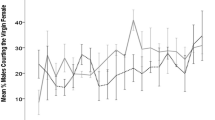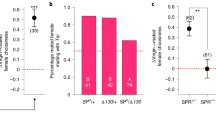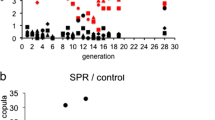Abstract
Previous research has described conditions which will alter the mating behavior of femaleDrosophila. MaleD. melanogaster exposed to mated females or immature males will show reduced levels of courtship toward normally attractive virgin females or immature males, respectively. Experiments allowing experienced and naive subject males to compete for virgin females are described. The results indicate that experience with mated females does not significantly alter the effectiveness of a male competing for a mate. However, experience with immature males can significantly increase the chances of securing a mate in some circumstances. These results are consistent with previous suggestions that “learning” phenotypes inD. melanogaster may be associated with evolutionary fitness.
Similar content being viewed by others
References
Bastock, M., and Manning, A. (1955). The courtship ofDrosophila melanogaster.Behaviour 8:85–111.
Cook, R. M. (1975). Courtship ofDrosophila melanogaster: Rejection without extrusion.Behaviour 52:155–171.
Ewing, L. S., and Ewing, A. W. (1984). Courtship inDrosophila melanogaster: Behaviour of mixed-sexed groups in large observation chambers.Behaviour 90:184–202.
Gailey, D. A., Jackson, F. R., and Siegel, R. W. (1982). Male courtship inDrosophila: The conditioned response to immature males and its genetic control.Genetics 102:771–782.
Gailey, D. A., Jackson, F. R., and Siegel, R. W. (1984). Conditioning mutations inDrosophila melanogaster affect an experience-dependent behavioral modification in courting males.Genetics 106:613–623.
Gromko, M. H., Sheehan, K., and Richmond, R. C. (1980). Random mating in two species ofDrosophila.Am. Nat. 115:467–479.
Gromko, M. H., Gilbert, D., and Richmond, R. C. (1984). Sperm transfer and use in the multiple mating system ofDrosophila. In Smith, R. L. (ed.),Sperm Competition and the Evolution of Mating Systems, Academic Press, New York.
Hall, J. C. (1984). Complex brain and behavioral functions disrupted by mutations inDrosophila.Dev. Genet. 4:355–378.
Hewitt, J. K., Fulker, D. W., and Hewitt, C. A. (1983). Genetic architecture of olfactory discriminative avoidance conditioning inDrosophila melanogaster.J. Comp. Psychol. 97:52–58.
Jallon, J.-M., and Hotta, Y. (1979). Genetic and behavioral studies of female sex appeal inDrosophila.Behav. Genet. 9:257–275.
Manning, A. (1967). The control of receptivity in femaleDrosophila.Anim. Behav. 15:239–250.
Markow, T. A., Quaid, M., and Kerr, S. (1978). Mating experience and competitive courtship success inDrosophila melanogaster.Nature 276:821–822.
McRobert, S. P., and Tompkins, L. (1983). Courtship of young males is ubiquitous inDrosophila melanogaster.Behav. Genet. 13:517–523.
Milkman, R., and Zeitler, R. R. (1974). Concurrent multiple paternity in natural and laboratory populations ofDrosophila melanogaster.Genetics 78:1191–1193.
Pruzan, A. (1976). Effects of age, rearing and mating experiences on frequency dependent sexual selection inDrosophila pseudoobscura.Evolution 30:130–145.
Quinn, W. G., Harris, W. A., and Benzer, S. (1974). Conditioned behavior inDrosophila melanogaster.Proc. Natl. Acad. Sci. USA 71:708–712.
Scott, D., and Richmond, R. C. (1985). An effect of mate fertility on the attractiveness and oviposition rates of matedDrosophila melanogaster females.Anim. Behav. (in press).
Siegel, R. W., and Hall, J. C. (1979). Conditioned responses in courtship behavior of normal and mutantDrosophila.Proc. Natl. Acad. Sci. USA 76:3430–3434.
Spieth, H. T., and Ringo, J. M. (1983). Mating behavior and sexual isolation inDrosophila. In Ashburner, M., Carson, H. L., and Thompson, J. N., Jr. (eds.)The Genetics and Biology of Drosophila, Vol. 3c, Academic Press, New York.
Tompkins, L., and Hall, J. C. (1981). The different effects on courtship of volatile compounds from mated and virginDrosophila females.J. Insect Physiol. 27:17–21.
Tompkins, L., Hall, J. C., and Hall, L. M. (1980). Courtship-stimulating volatile compounds from normal and mutantDrosophila.J. Insect Physiol. 26:689–697.
Tompkins, L., Gross, A. C., Hall, J. C., Gailey, D. A., and Siegel, R. W. (1982). The role of female movement in the sexual behavior ofDrosophila melanogaster.Behav. Genet. 12:295–307.
Tompkins, L., Siegel, R. W., Gailey, D. A., and Hall, J. C. (1983). Conditioned courtship inDrosophila and its mediation by association of chemical cues.Behav. Genet. 13:565–578.
Author information
Authors and Affiliations
Additional information
This work was supported by the National Science Foundation under Grants BSR-8411503 to S.Z. and DEB 81-18405 to R.C.R.
Rights and permissions
About this article
Cite this article
Zawistowski, S., Richmond, R.C. Experience-mediated courtship reduction and competition for mates by maleDrosophila melanogaster . Behav Genet 15, 561–569 (1985). https://doi.org/10.1007/BF01065451
Received:
Accepted:
Issue Date:
DOI: https://doi.org/10.1007/BF01065451




